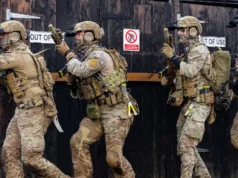The Five Eyes alliance, comprising intelligence and law enforcement agencies from the UK, US, Canada, Australia, and New Zealand, has issued an unprecedented call to action to address the growing threat of child radicalisation by online extremists.
According to a newly published paper, Young People and Violent Extremism: A Call for Collective Action, the issue has escalated globally, requiring a “whole society response.”
Assistant Commissioner Matt Jukes, Head of Counter Terrorism Policing in the UK, highlighted the urgency of the issue: “Since 2020, Counter Terrorism Policing has been warning of the growing numbers of children being arrested in relation to terrorism offences. Last year, we arrested more children than we ever have before, some as young as 12 years old. For all the benefits it brings, the internet has also globalised extremism, accelerated the spread of hateful ideologies internationally, and made it possible for anyone with an internet connection to reach into the lives of children halfway around the world.”
The report underscores that addressing this issue requires the involvement of parents, governments, tech companies, and wider society, noting that law enforcement alone cannot tackle the problem effectively. It also identifies specific vulnerabilities of minors, including their fluency with digital platforms and their unique susceptibility to online influence.
Assistant Commissioner Jukes stressed, “Many threads have to come together if we are to stop this conveyor belt leading children towards extremism. The technology companies making vast amounts of money from children on their platforms must invest in making those platforms safer. Parents need to take a more active role in their children’s online lives.”
The paper also calls for legislative reforms to empower law enforcement and greater accountability from tech platforms to ensure safer online environments. Mike Burgess, Director-General of the Australian Security Intelligence Organisation (ASIO), highlighted the alarming statistics in Australia: “Around twenty per cent of ASIO’s priority counter-terrorism cases involve young people. In every one of the terrorist attacks, disruptions, and suspected terrorist incidents in Australia this year, the alleged perpetrator was a young person.”
He added, “As a parent, the numbers are shocking. As an intelligence officer, the numbers are sobering.”
The Five Eyes alliance is urging parents to monitor their children’s online activities, governments to bolster legislative measures, and technology companies to prioritise safety on their platforms.














> .. some as young as 12 …
Its worth considering that many of the ‘cultures’ associated with terrorism/extremism, do not have our cozy warm definition of children. Boys over 12, or 13 or 14 are expected to be ‘men’ to a large degree. Some regimes expect military service at 14. In such worlds, its not children being recruited at all.
The examples in the paper include a boy who said nasty things about a girl at school, kids who engaged in petty vandalism, etc. They might all be horrible little brats, but not one of them actually committed violent offenses. Unless they are really planning an act of terrorism or actually associated with militant groups (especially foreign terrorist organizations), sending them to prison for months or years seems ridiculous. This kind of thing should be dealt with by parents and schools.
If police are arresting 12 year olds – who barely have the capacity for criminal responsibility – then this suggests a serious overreaction.
“Parents need to take a more active role in their children’s online lives.”
The business model innovation in the attention economy encourages unsafe activity (e.g. Gambling) for young children and only grudgingly submits to the Age Rating system. For example the age restricted content on Google/Alphabet owned You Tube is full of profanity and inappropriate behaviour. These big tech enterprises must take much more responsibility for their content and ‘the algorithm’ to avoid harming the vulnerable. Yes, that’s going to cost but quality content always does and should.
So well before your children might come to extremist content, the big tech enterprises are actively working to monitize every one of them with platform specific currencies, hyped game events, and costs for not doing what big tech wants.
No, this isn’t a reactionary rant, just the experience of how modern life changes are not necessarily always for the better. The subtlety and pervasive nature of this innovation are widely misunderstood and ignored by busy people, just as big tech intends…